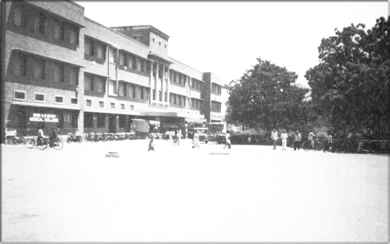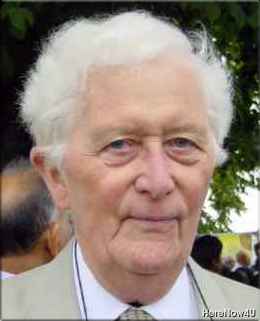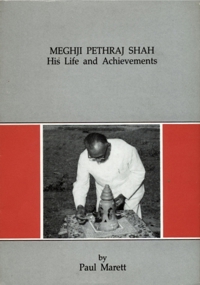
Mr. J. K. Gohel of the Indian Administrative Service was, in due course, to become a close associate of Meghjibhai and in 1960 joined Meghjibhai's Group as an adviser in London. He recalls his first acquaintance with Meghjibhai:
'In early 1952 when I was the Collector and District Magistrate in Jamnagar, Saurashtra, I met Meghjibhai for the first time. I was a newcomer to Jamnagar and was not well acquainted with the leading figures of the district, many of whom had spent some time in East Africa.
'One day Premchand Vrajlal Shah, Meghjibhai's very close friend and former business partner, called on me with Meghjibhai and some eight or ten leading figures of the locality. The purpose of the meeting was simply to get to know one another. We had a general discussion about the problems of Halar district. I was so much impressed by the ideas and opinions of Meghjibhai that I made further inquiries about him of my colleagues in the office. It was part of my duties to get well acquainted with the leading figures in my district so I tried to find out as much as I could about him. It just happened that Shri Dhebarbhai, the Chief Minister of Saurashtra, telephoned me that evening. After a conversation about routine matters he asked me if I had met Meghjibhai. I told Shri Dhebarbhai that I had met Meghjibhai and that I had been very impressed by him. The Chief Minister told me to make closer acquaintance with Meghjibhai and assess the possibility of getting donations from him for the development plans of Saurashtra.
'Afterwards, I frequently saw Premchandbhai and Meghjibhai. Our purpose was to get a donation of a million to a million and a half rupees for certain smallish projects or towards founding a medical college in Saurashtra. In those days there was not a single medical college in Saurashtra and one was badly needed. Meghjibhai took a deep interest in this. He called for further information about various development projects and asked how people like himself could help. We asked him on what terms he would be prepared to give a donation towards these projects. I have to say that he expressed himself frankly and bitterly about government machinery and officials. He firmly believed that no government could undertake a single enterprise with the same skill as a businessman. The government would derange and delay things and would not keep its promises. In fact, he was very doubtful that his donations would be put to good use for they would not reach the very people who were struggling to improve their lot.
'Meghjibhai's views opened my eyes. He said quite plainly that he did not want to present us with a gift on a plate in order to make things easy for me or the government. His eyes flashed as he said this: he wanted to test our resolve to put his donations to use. He stuck firmly to one principle, that the public should get, on a permanent basis, a threefold benefit from every rupee of his donation. So, if a project cost three hundred rupees in all, he himself would donate one hundred rupees, another hundred should be collected from the people of the place where the project was to be implemented and the remaining hundred rupees should be given by the state or central government. According to the terms previously agreed the state government should guarantee the running and possible future development of the project.
'I was silenced by the fervour with which he expressed his views and could raise no counter-argument. I simply expressed the hope that his views about the government machinery might change. I tried to inject a lighter element into the conversation but he was shrewd enough to realize that I was trying tactfully to lead him on to our project. He expressed his views so vigorously and in such forcible language that listening to him we were shocked and confused'.
After this, Mr. Gohel had discussions with the Chief Minister. He goes on to recount the sequel:
'I talked in detail about all this to Dhebarbhai, the Chief Minister, who was also in direct contact with Meghjibhai. As a result he, together with the Home Minister, Rasikbhai Parikh, and the Finance Minister, Manubhai Shah, came to Jamnagar and we all had a discussion with Meghjibhai at Premchandbhai's place. There was a family atmosphere about the Saurashtra state government in those days. The discussion was friendly and lasted for an hour at the end of which Shri Meghjibhai gave a written undertaking for a donation of six million rupees and a verbal promise of four million more. We were overcome with emotion.
Before this I would not have believed that any merchant in India would give so much as a single paise without a selfish purpose but from then onwards I began to have a higher regard for the trading community. Meghjibhai accepted our demands so promptly that for a long time I could not believe it. I was worried that if this was all a joke I would get the sack. But no, he was in real earnest.
'This is how our acquaintance began. From the very first meeting I realized that he was a great man. If we say that he was an extraordinary man we only underestimate his greatness. Thus the medical college came into existence and it has progressed steadily to the present.'
Not only the medical college, but also many other projects were put in hand: the programme was no sooner agreed than its implementation began. By the end of 1954 thirty-seven primary schools had been built and handed over to the government. Doubtless, Meghjibhai remembered the start in life, which he had received more than fort y years before, when he was fortunate enough to live in a village, which possessed a small primary school. He himself had been a teacher briefly in the school and now the former teacher was endowing schools to give the rising generation the opportunity, which he had enjoyed. A typical school is in the village of Chela, a few miles from Jamnagar. A long plain building with a roof of local tiles stands in a gravelled courtyard. It is Spartan by Western standards but solidly constructed and well suited to its purpose. A technical school for a hundred boys of practical rather than intellectual talents was erected in Jamnagar and a hostel attached to it was named after one of Gujarat's most famous sons, the Mahatma Gandhi Sarvodaya Chhatralaya. Work was soon started on another fourteen primary schools, a maternity home and a hospital.
There was an urgent need for medical education in the region and the Trust donated one and a half million rupees to start a medical college in Jamnagar. On 15th April 1955 the ceremony of laying the foundation stone of the Shri M.P. Shah Medical College took place. The state Raj Pramukh himself presided and warmly commended Meghjibhai's public spirit and generosity. Many Saurashtra government ministers, including Dhebarbhai and Rasikbhai Parikh, were present together with some leading personalities. Meghjibhai was rather embarrassed by the fulsome eulogies. Pressed to make a speech he stood up and spoke briefly after this fashion:
'I am a businessman. Lecturing is not my speciality, but since you insist I shall say a few words.
'Since getting independence the government of Saurashtra has made proper efforts to enrich Saurashtra. This college is one result of its efforts. It is right and proper that the government does its duty but the modernisation of the nation will be completed only if every person contributes, as much as he can, to this end. Accordingly, I too, am making a contribution according to my means in order to fulfil my own obligation. By making this contribution I am not obliging anybody but I am simply doing my duty. I have now retired from all business activities. I have no business interests left and no personal income from them. I have made up my mind not to engage in any business activity for the rest of my life. It is my desire to pass the rest of my life by contributing mentally, physically and financially to works, which will be of service to the people.
'We have thought out plans, if God is favourable, to spend more than ten million rupees over the next ten years on educational, medical and other activities under the auspices of our Trust. These activities have been speeded up, especially since last year. Up to now we have erected and equipped thirty-seven buildings for primary schools and have handed them over to the government. Today sees the laying of the foundation stone of this medical college. On this occasion I will add a few words addressed to the youth of Saurashtra. This institution is being set up for you. If, after receiving your education here, you use it in the service of Saurashtra and the nation rather than in pursuing personal financial gain, the tree planted by His Highness Jamsaheb will bear good fruit.'
It was a frank and modest speech, free from pride or ostentation in spite of the fact that a donor of ten million rupees to his native place is rare indeed and was certainly unprecedented in Saurashtra.
The M.P. Shah Medical College opened with sixty students, using the old District Court building temporarily.

M.P. Shah Medical College, Jamnagar
In 1960 the large College building provided by Meghjibhai' s donation was ready, a solidly constructed building designed especially for its purpose. Originally the students took the M.B.B.S. degree of Gujarat University but since the establishment of Saurashtra University at Rajkot their degrees have been awarded by that institution. This is the only medical college serving the large area of Saurashtra. The annual intake of undergraduate students has risen to 175 and the College now has a total of eight hundred undergraduates and nearly three hundred postgraduates. The latter are pursuing higher studies in a dozen different specialities ranging from Anaesthesiology to Paediatrics. Around three hundred, or just over a quarter of the total number of students, are women. Altogether, up to 1987, 3205 students of this College had been awarded the M.B.B.S. degree.
The expansion has, of course, involved new buildings and, in line with Meghjibhai' s philosophy of collaboration between donor and authorities, the government has added further teaching and residential accommodation.
 Dr. Paul Marett
Dr. Paul Marett

